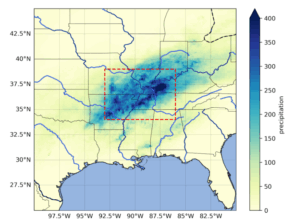Now Reading: Effective emergency management prevented larger catastrophe after climate change fueled heavy rains in Central Mississippi river valley
-
01
Effective emergency management prevented larger catastrophe after climate change fueled heavy rains in Central Mississippi river valley
Effective emergency management prevented larger catastrophe after climate change fueled heavy rains in Central Mississippi river valley

In early April, severe storms hit the Central Mississippi river valley in the United States, causing extreme rainfall and numerous tornado warnings. The region experienced catastrophic flooding between April 2nd and 6th, with some areas receiving over 16 inches of rain, the most ever recorded in that region. The floods were described as potentially historic, causing widespread damage across several states.
The severe weather led to at least 24 fatalities, with 15 attributed to flooding. Tennessee was the most affected, with at least 10 deaths. Tennessee, Kentucky, and Arkansas declared states of emergency in response. The storm caused economic damages estimated between $80 and $90 billion, and power outages affected thousands of residents.
Scientists from various countries conducted an event attribution study to analyze the impact of human-caused climate change on the heavy rainfall that led to the floods. The study focused on the Central Mississippi river valley region and found that extreme rainfall events like the one observed are becoming more likely and intense due to climate change.
The floods caused significant damage to agricultural fields in Arkansas, resulting in an estimated $78 million in losses. The extreme rainfall event was found to be relatively rare, occurring once every 90-240 years in today’s climate. Climate models project that such extreme precipitation events will become more frequent and intense as global temperatures rise.
Despite the complexity of the event, the US National Weather Service provided early warnings for the floods, allowing emergency departments to prepare and evacuate those at risk. However, NWS offices are facing staffing challenges, which could impact their ability to respond to extreme weather events in the future.






